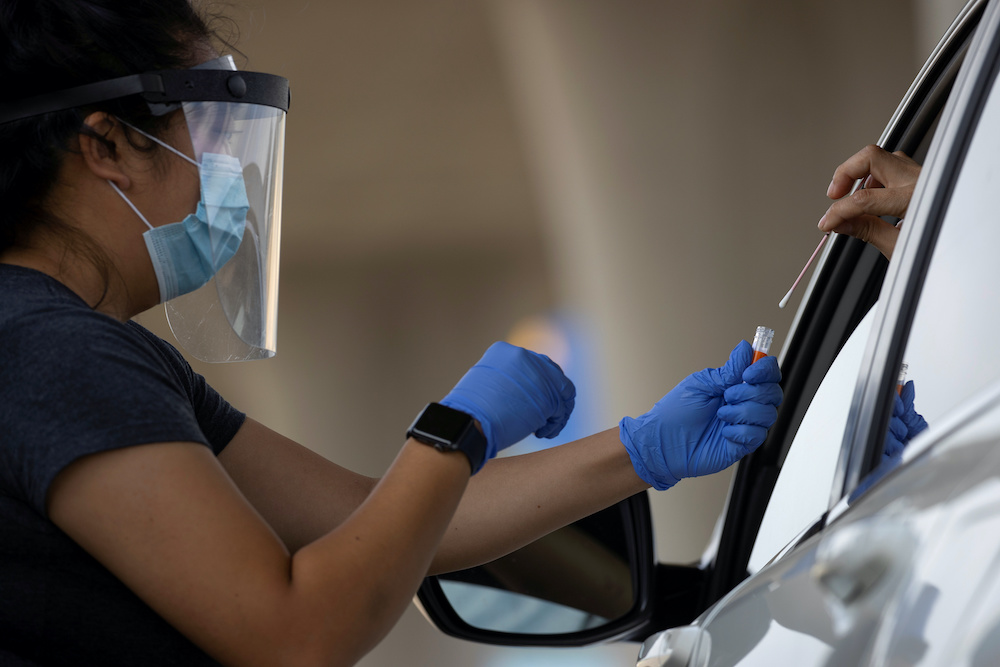LOS ANGELES, June 28 — When the coronavirus pandemic first snowballed in the United States, California was hailed for its handling of the crisis.
But now, the Golden State — like many others across the nation — is facing a worrying uptick in the number of cases, especially among young people.
California was the first state to order a sweeping lockdown in mid-March and moved quickly to ramp up its testing capabilities — a key to keeping the virus in check, experts say.
Since the start of the crisis, some 3.7 million Californians out of a total of about 40 million have been tested for the new coronavirus.
This week, the state did about 100,000 tests a day.
Is that significant increase in testing the explanation for the virus’s seeming resurgence? Experts say it only paints part of the picture.
“The fact that there’s also an increase in the number of hospitalisations suggests that it’s not just because of the testing,” said Lee Riley, an epidemiologist at the University of California, Berkeley.
“That means that there are more transmissions occurring.”
Governor Gavin Newsom says the number of patients hospitalised with Covid-19, the disease caused by the virus, jumped 32 per cent in the last two weeks, to more than 4,200.
The specific reasons are hard to pinpoint, but experts say the likely culprit is quarantine fatigue and a relaxing of behaviours meant to curb the spread, among young people.
As lockdowns have been gradually lifted, more and more people are gathering without respecting social distancing guidelines or wearing face masks.
“We cannot continue to do what we have done over the last number of weeks,” said Newsom, who made wearing masks in public spaces obligatory last week.
“Many of us, understandably, developed a little cabin fever. Some, I would argue, have developed a little amnesia. Others have just frankly taken down their guard.”
‘Selfish’ young people
Officially, members of different households in California are still not supposed to mingle in close quarters indoors.
But as the state’s massive economy has reopened, with stores, restaurants and gyms all ready for business, residents have been getting together once again for birthday parties, summer barbecues and beach trips.
“I’m not naive — people are mixing,” Newsom said. “And that is increasing the spread of this virus.”
“It is incumbent upon us to recognise that... it is our behaviours that are leading to these numbers and we are putting people’s lives at risk,” he added.
Newsom, a Democrat, said he was concerned that the new cases were detected in people who were “younger and younger.”
“You’re young, and so you feel a little bit more invincible. But respectfully, often that can be a selfish mindset,” he warned.
For Barbara Ferrer, the health director for Los Angeles County, California’s main virus hotspot, while young people may not get as sick as others, “what they are at the highest risk for is being spreaders.”
Crowd control
Another factor in California’s virus battle may be the mass anti-racism protests that erupted in several cities in the wake of the May killing in police custody of George Floyd in Minneapolis.
Some of the demonstrations in California drew thousands and thousands of people, who spent hours in rather close proximity to one another.
While Ferrer said it would be hard to say definitively that the protests had played a role, she called it “highly likely, given the increased numbers that we’re seeing.”
What happens now?
For the time being, Newsom has not indicated that he will backtrack on lifting restrictions, or impose any targeted lockdowns.
Anthony Fauci, one of the US government’s top experts on infectious diseases, said the governor had not made any obvious missteps in its response to the crisis.
“I don’t think it’s anything that the state of California is doing wrong or not — it’s what the response of the people are to what the opening process is,” Fauci said.
Anne Rimoin, an epidemiologist and public health specialist at UCLA, said the uptick “shouldn’t be surprising to anybody.”
“If you are not socially distancing, you’re not wearing a mask, if you’re opening too soon, you’re going to see a spike in cases,” Rimoin said. “This isn’t rocket science.”
“The reality of it is we’re going to see a lot more cases and a lot more deaths if we’re not all careful,” she added.
As of Friday, nearly 200,000 cases have been counted in California. More than 5,700 people have died of Covid-19. — AFP






















